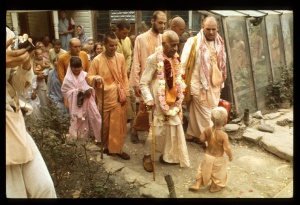CC Madhya 21.100

A.C. Bhaktivedanta Swami Prabhupada
TEXT 100
yan martya-līlaupayikaṁ sva-yoga-
māyā-balaṁ darśayatā gṛhītam
vismāpanaṁ svasya ca saubhagardheḥ
paraṁ padaṁ bhūṣaṇa-bhūṣaṇāṅgam
SYNONYMS
yat—that which; martya-līlā—pastimes in the material world; aupayikam—just suitable for; sva—His own; yoga-māyā—of the spiritual potency; balam—the strength; darśayatā—showing; gṛhītam—accepted; vismāpanam—even producing wonder; svasya—for Himself; ca—also; saubhaga-ṛdheḥ—of abundant good fortune; param—supreme; padam—abode; bhūṣaṇa—of ornaments; bhūṣaṇa-aṅgam—the limbs of which were the ornaments.
TRANSLATION
“‘To exhibit the strength of His own spiritual potency, Lord Kṛṣṇa manifested a form just suitable for His pastimes in the material world. This form was wonderful even for Him and was the supreme abode of the wealth of good fortune. Its limbs were so beautiful that they increased the beauty of the ornaments worn on different parts of His body.’
PURPORT
This verse from Śrīmad-Bhāgavatam (SB 3.2.12) is stated in a conversation between Vidura and Uddhava. Uddhava thus begins his description of the pastimes of Śrī Kṛṣṇa in His form exhibited by yogamāyā.